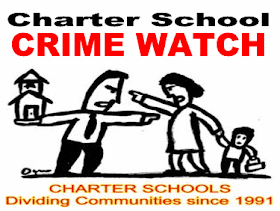Federal audit spotlights charter school shortcoming

A national audit of charter school management companies by the U.S. Department of Education has spotlighted an unnamed Chester City school where, auditors say, the CEO wrote checks to himself totaling $11 million without board approval.
The report by the Office of Inspector General did not accuse the CEO of wrongdoing, but offered its finding as an example of a conflict of interest and lack of financial controls that could make the schools vulnerable to fraud.
The report cited similar issues at four unnamed Philadelphia charter schools.
In the instance of the Chester school, federal auditors reported that the CEO of the management organization wrote checks to himself in 2008-09.
According to the federal report, the school's lawyer reported that the charter had changed its policy to address the weakness in fiscal controls, including requiring the board to approve such payments. However, the audit said, the school "could not provide written procedures to support the change."
While the audit did not name the school, there is only one charter in Chester City - Chester Community Charter School.
The school, which has more than 3,000 K-8 students, is the largest brick-and-mortar charter in the state. The most recent annual report from the state Department of Education shows that the school had total revenue of $45.1 million in the fiscal year 2013.
Vahan H. Gureghian, a lawyer and entrepreneur who has been active in Republican politics, is the founder and CEO of CSMI Education Management, which manages Chester Community.
Auditor General Eugene De Pasquale repeatedly has criticized the ties between Chester Community and Gureghian's firm.
In an audit of Chester Community in 2013 and a report in August, De Pasquale questioned the $1.2 million the school received between 2008 and 2011 in lease reimbursements from the state Department of Education.
A. Bruce Crawley, spokesman for Chester Community, said Tuesday night that federal auditors did not identify any "improper payments" and added that the school wanted to clarify what its financial management practices were at that time.
He said the CEO of the management company for Chester Community "never approved or issued checks, in any amount, that had not been included in the school's annual budget and previously approved by the management company's board."
Crawley said that under a management agreement signed in 2001, the company "was responsible for all expenses of the school, including physical plant, operations, and staff and teacher salaries."
He said that the budget also was approved by the board of the school, which is a nonprofit, and that the management company provided monthly reports on all school-related expenditures.
Crawley said that under a new agreement approved in 2009, the charter school became responsible for paying all school-related expenses.
He said Chester Community's lawyer sent information to the U.S. Department of Education in 2013 that explained how fiscal responsibilities for the management company changed in July 2009.
The school, Crawley said, never received a response from the department and continues to operate under the 2009 agreement.
In all, the inspector general's audit examined 33 schools in six states to assess the risk that charter school relationships with charter management organizations pose to federal programs.
Catherine Grant, an Inspector General's Office spokeswoman, said the report did not identify the schools or the management companies "to preserve their anonymity."
She said the audit focused on oversight by the U.S. Department of Education and state and local agencies that authorize charter schools.
"It was not an audit of individual schools," she said.
In addition to Pennsylvania, the states where charter schools were reviewed were California, New York, Florida, Michigan, and Texas.
Investigators found internal control weaknesses with charter management organizations at 22 of the 33 schools reviewed. They spotted 24 cases of conflicts of interest and transactions with related parties at 17 of the charter schools.
At one of the charter schools in Philadelphia, they found several examples of conflicts of interest. Four officers of the management firm sat on the nine-member charter school board. And the charter representative who signed the school's management contract was the CEO of the management company; the management company's representative was a member of the school's board.
That Philadelphia charter school also made payments to a vendor affiliated with the management company.
In another Philadelphia case, the charter management company appointed the first three members of the school's board, and those members then selected the remaining members.Federal audit spotlights charter school shortcoming:
martha.woodall@phillynews.com 215-854-2789 @marwooda

